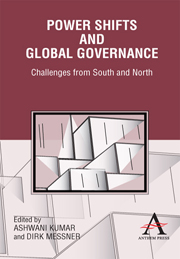Book contents
- Frontmatter
- Contents
- List of Contributors
- Foreword
- Power Shifts and Global Governance
- Part One Theoretical and Analytical Reflections on Global Governance
- Part Two Power Shifts, Regional Experiences and Global Challenges
- Part Three Case Studies in Global Governance
- 13 Unity in Diversity: South Coalitions as Governance Adaption Vehicles in Global Trade Governance
- 14 In the Foggy Middle East: Just Wars Remain the Name of the Game
- 15 Evaluation Capacity Development in the Arab Region: How Monitoring and Evaluation is Perceived and Applied?
- 16 UNEP Institutional Reform with its Impact on Developing Countries
- 17 The Heiligendamm Process and Emerging Powers: More of the Same or a Genuine Global Governance Innovation?
- Notes
15 - Evaluation Capacity Development in the Arab Region: How Monitoring and Evaluation is Perceived and Applied?
from Part Three - Case Studies in Global Governance
Published online by Cambridge University Press: 05 March 2012
- Frontmatter
- Contents
- List of Contributors
- Foreword
- Power Shifts and Global Governance
- Part One Theoretical and Analytical Reflections on Global Governance
- Part Two Power Shifts, Regional Experiences and Global Challenges
- Part Three Case Studies in Global Governance
- 13 Unity in Diversity: South Coalitions as Governance Adaption Vehicles in Global Trade Governance
- 14 In the Foggy Middle East: Just Wars Remain the Name of the Game
- 15 Evaluation Capacity Development in the Arab Region: How Monitoring and Evaluation is Perceived and Applied?
- 16 UNEP Institutional Reform with its Impact on Developing Countries
- 17 The Heiligendamm Process and Emerging Powers: More of the Same or a Genuine Global Governance Innovation?
- Notes
Summary
Introduction
Globalization cannot be merited on its right unless it realizes development by the people, and for them. Anti-globalizers are keen mostly on portraying many of its discontents; while pro-globalizers tend to emphasize the contrary (Stiglitz 2002). The ongoing debate on the global front bids for a pause and reflection about the ‘winners’ and ‘losers’ of the collapsing walls and borders leading to fast-track mobility of goods, services, benefits, costs and, notably, risks.
Development is all about ‘people’. Countries which were able to infiltrate macro-gains to the micro-local citizens are said to realize this undertaking. Some others retain a classical view pertaining to the measurement of ‘growth indicators’ that lacked focus on the ‘impact of development’ policy, program and project interventions. Democratic participation, governance and public accountability are important elements that can catalyze development impact on the grass root citizen.
Juxtaposed to an open world vulnerable to contagious hazards, a constant rise of development ‘monitoring and evaluation’ (M&E) came into being more vehemently since the early 1980s. The Arab region continues to be at the dawn of development impact measurement despite its many riches. Many aspects of governance continue to lag behind, let alone the numerous attempts to globalize, modernize its state structures and reverse gear towards extroversion (Abdelhamid 2005). Genuine interest in the cause of development monitoring and evaluation is yet to come.
- Type
- Chapter
- Information
- Power Shifts and Global GovernanceChallenges from South and North, pp. 289 - 300Publisher: Anthem PressPrint publication year: 2010

